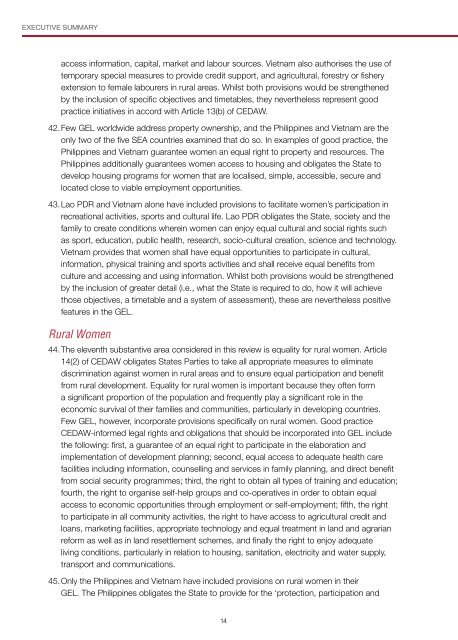Gender Equality Laws - CEDAW Southeast Asia
Gender Equality Laws - CEDAW Southeast Asia
Gender Equality Laws - CEDAW Southeast Asia
You also want an ePaper? Increase the reach of your titles
YUMPU automatically turns print PDFs into web optimized ePapers that Google loves.
EXECUTIVE SUMMARYaccess information, capital, market and labour sources. Vietnam also authorises the use oftemporary special measures to provide credit support, and agricultural, forestry or fisheryextension to female labourers in rural areas. Whilst both provisions would be strengthenedby the inclusion of specific objectives and timetables, they nevertheless represent goodpractice initiatives in accord with Article 13(b) of <strong>CEDAW</strong>.42. Few GEL worldwide address property ownership, and the Philippines and Vietnam are theonly two of the five SEA countries examined that do so. In examples of good practice, thePhilippines and Vietnam guarantee women an equal right to property and resources. ThePhilippines additionally guarantees women access to housing and obligates the State todevelop housing programs for women that are localised, simple, accessible, secure andlocated close to viable employment opportunities.43. Lao PDR and Vietnam alone have included provisions to facilitate women’s participation inrecreational activities, sports and cultural life. Lao PDR obligates the State, society and thefamily to create conditions wherein women can enjoy equal cultural and social rights suchas sport, education, public health, research, socio-cultural creation, science and technology.Vietnam provides that women shall have equal opportunities to participate in cultural,information, physical training and sports activities and shall receive equal benefits fromculture and accessing and using information. Whilst both provisions would be strengthenedby the inclusion of greater detail (i.e., what the State is required to do, how it will achievethose objectives, a timetable and a system of assessment), these are nevertheless positivefeatures in the GEL.Rural Women44. The eleventh substantive area considered in this review is equality for rural women. Article14(2) of <strong>CEDAW</strong> obligates States Parties to take all appropriate measures to eliminatediscrimination against women in rural areas and to ensure equal participation and benefitfrom rural development. <strong>Equality</strong> for rural women is important because they often forma significant proportion of the population and frequently play a significant role in theeconomic survival of their families and communities, particularly in developing countries.Few GEL, however, incorporate provisions specifically on rural women. Good practice<strong>CEDAW</strong>-informed legal rights and obligations that should be incorporated into GEL includethe following: first, a guarantee of an equal right to participate in the elaboration andimplementation of development planning; second, equal access to adequate health carefacilities including information, counselling and services in family planning, and direct benefitfrom social security programmes; third, the right to obtain all types of training and education;fourth, the right to organise self-help groups and co-operatives in order to obtain equalaccess to economic opportunities through employment or self-employment; fifth, the rightto participate in all community activities, the right to have access to agricultural credit andloans, marketing facilities, appropriate technology and equal treatment in land and agrarianreform as well as in land resettlement schemes, and finally the right to enjoy adequateliving conditions, particularly in relation to housing, sanitation, electricity and water supply,transport and communications.45. Only the Philippines and Vietnam have included provisions on rural women in theirGEL. The Philippines obligates the State to provide for the ‘protection, participation and14
















